How To Get Your Pressure Washing Business Insurance
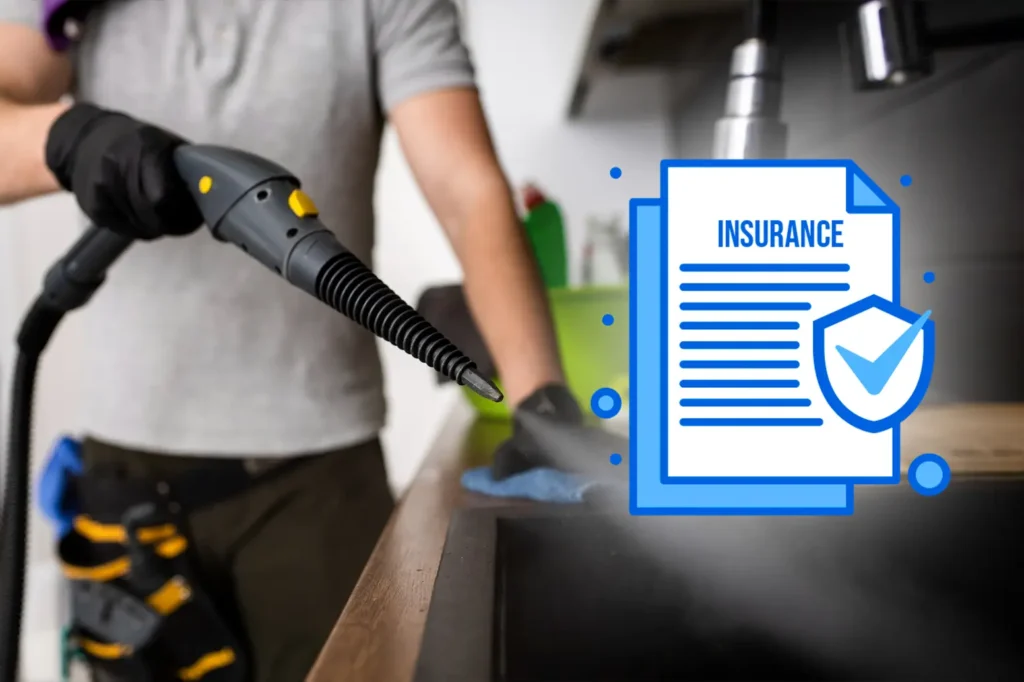
Table of Contents
- Why Do Pressure Washing Services Need Business Insurance?
- What Types of Insurance Do Pressure Washing Businesses Need?
- How Much Does Insurance Cost for Pressure Washing Businesses?
- Pressure Washing Insurance Requirements
- How Do I Get Pressure Washing Insurance? (Step-by-Step)
- A Better Alternative for Contractors
- FAQs about Pressure Washing Business Insurance
Running a pressure washing business comes with risks: slippery surfaces, expensive equipment, and the potential for client property damage. 92% of small businesses have business insurance, highlighting why having the right pressure washing business insurance is critical. It protects you from lawsuits, accidents, and financial loss while giving your clients peace of mind.
In this guide we will cover:
- Why pressure washing services need business insurance
- The types of coverage options available for pressure washing businesses
- The cost of small business insurance for pressure washing across different states
- Insurance requirements contractors must meet
- How to get coverage step-by-step
Why Do Pressure Washing Services Need Business Insurance?
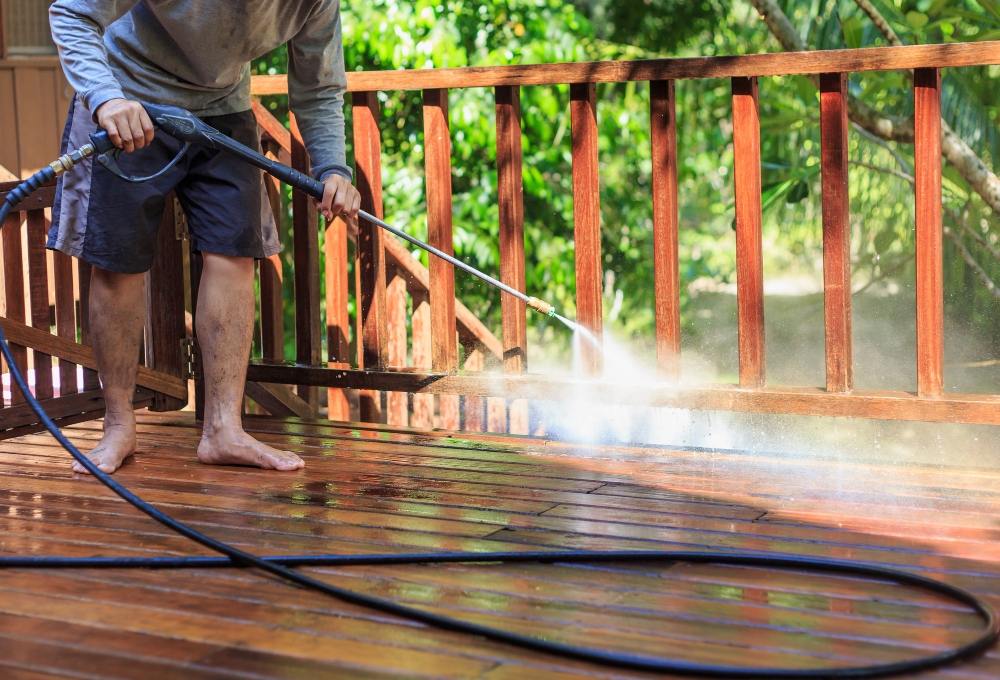
Pressure washing businesses face unique risks. From using high-powered equipment on client property to operating on slippery job sites, accidents can happen. Business insurance provides financial protection, covering the costs of property damage, bodily injury, or lawsuits. Without the right insurance coverage, a single accident could bankrupt a small business and harm your reputation.
Here’s why insurance matters:
- Protects against costly accidents: Pressure washing liability insurance covers damage such as broken windows, cracked siding, or damaged roof shingles caused by high-pressure sprays.
- Provides peace of mind for clients: Customers feel safer hiring insured contractors because they know financial protection is in place.
- Shields your reputation and business stability: A claim without coverage can create financial loss and ruin client trust.
- Covers employee injuries: Worker’s compensation insurance ensures medical bills and lost wages are paid if employees are hurt on a job site.
- Helps with long-term growth: According to the U.S. Small Business Administration (SBA), insurance reduces risk, covers unexpected incidents, and supports stability so small businesses can scale confidently.
For additional tips on structuring your business before seeking insurance, see our How to Start a Pressure Washing Business: Complete Guide.

What Types of Insurance Do Pressure Washing Businesses Need?
Every pressure washing business should evaluate which type of coverage best fits their operations. Contractor insurance for cleaning businesses generally includes several options:
General Liability Insurance
Covers bodily injury, property damage, and lawsuits from accidents during cleaning. This is the most common and essential policy for pressure washing businesses.
Worker’s Compensation Insurance
Protects employees if they’re injured on the job. Workers comp pays medical bills and lost wages, and nearly every state requires it if you have staff. Without it, you could be held personally liable for employee injuries.
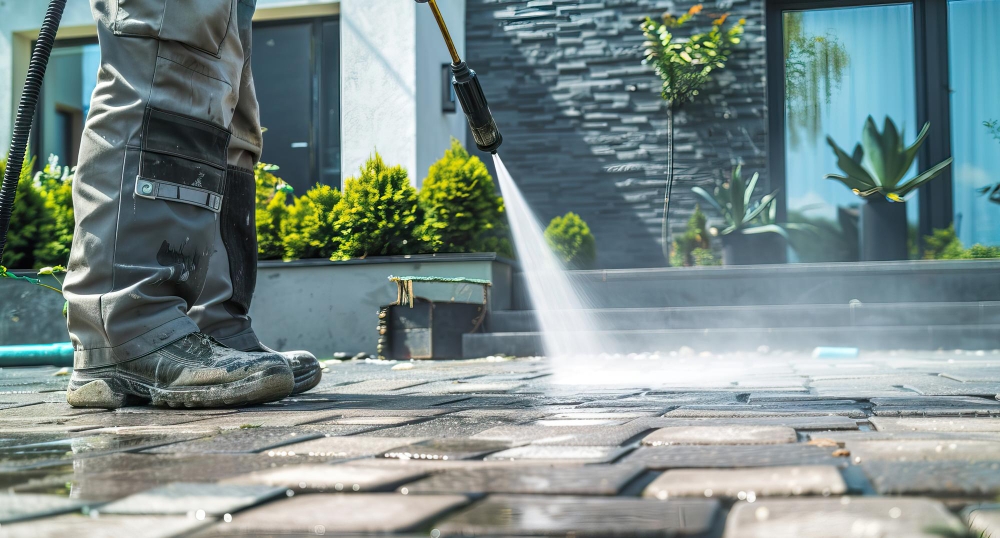
Janitorial Bonds
Offer reassurance to customers that they are financially protected if theft or dishonesty occurs during cleaning services.
Commercial Auto Insurance
Covers vehicles used to transport pressure washers, tools, and equipment. This policy helps cover the costs of accidents on the road, and it’s often required by state laws. Many insurance agents will bundle commercial auto with general liability for broader coverage.
Business Owner’s Policy (BOP)
A bundled plan combining general liability insurance and commercial property insurance. This is a cost-effective way to get wide-ranging coverage options for small pressure washing businesses.
Commercial Umbrella Insurance
Provides additional insurance coverage when existing policy limits are maxed out. This is highly recommended for contractors who handle large or high-value projects.
Tools & Equipment Insurance
Covers tools, spray nozzles, ladders, and pressure washers on a job site. It protects against theft, breakdowns, or fire damage. This type of coverage ensures you don’t lose income due to damaged equipment.
Contractor’s Errors & Omissions (E&O)
Also known as professional liability, this protects you from claims that your work was negligent, incomplete, or failed to meet client expectations.
For more information on equipment-related coverage, you can also check out our resources on Invoice Templates and Invoice Generator to stay organized when managing claims or equipment records.
How Much Does Insurance Cost for Pressure Washing Businesses?
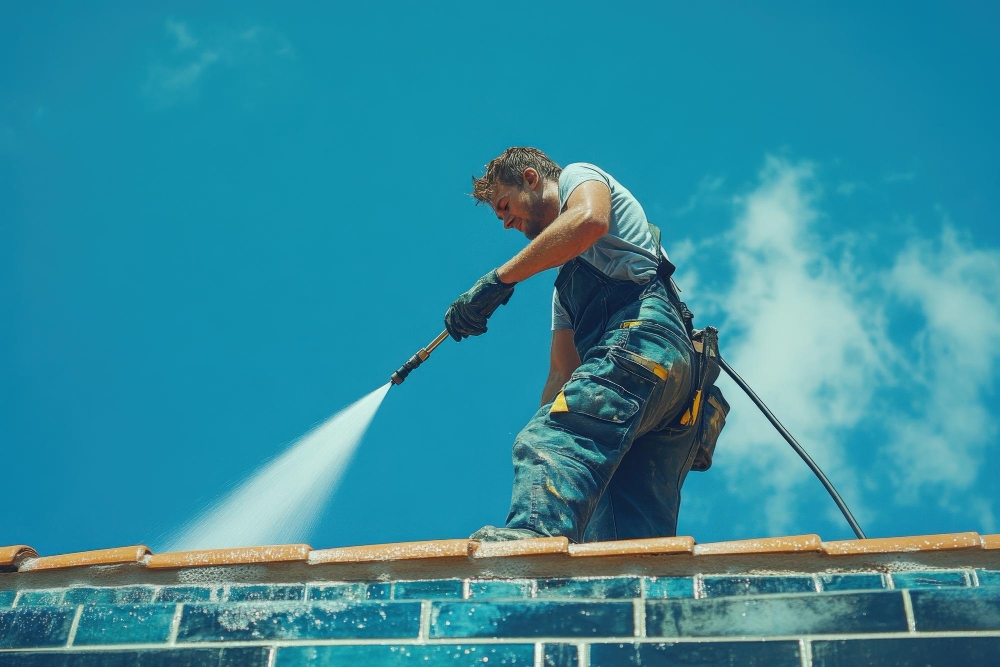
The cost of small business insurance for pressure washing varies based on your state, business size, and coverage options. On average, insurance costs range from $500 to $1,500 annually for general liability insurance. Adding workers compensation insurance, commercial auto insurance, or tools and equipment coverage increases costs but provides more protection.
According to Investopedia, general liability is the most affordable entry-level policy for contractors, but combining multiple policies often creates better financial protection for long-term success.
California
- Average cost: $800–$1,600 annually for general liability insurance.
- Strict worker’s compensation insurance requirements enforced by state law.
- Higher premiums due to dense urban areas and frequent job site risks.
- Many contractors add commercial auto insurance to cover trucks and equipment transport.
New York
- Average cost: $1,200–$2,000 annually.
- Dense cities increase likelihood of property damage claims, raising costs.
- Contractors often add umbrella policies for lawsuits and large financial loss coverage.
- Insurance agents recommend reviewing coverage options frequently because premiums can rise quickly.
Florida
- Average cost: $900–$1,800 annually.
- High exposure to hurricanes and floods increases commercial property insurance costs.
- Extra coverage for tools and equipment is commonly recommended.
- Worker’s compensation requirements are strict, and commercial auto insurance is mandatory for businesses with vehicles.
Texas
- Average cost: $700–$1,400 annually.
- Regulations are more flexible than other states but still require general liability and workers comp.
- Insurance quotes are generally lower, making coverage more affordable for small pressure washing businesses.
- Many companies add contractor’s E&O and commercial auto insurance for additional peace of mind.
For more details on pricing strategies beyond insurance, visit our guide on How To Price Pressure Washing Jobs in 2025?.
Pressure Washing Insurance Requirements
Insurance requirements for pressure washing businesses can differ widely by state, so it’s important to understand what is mandatory where you operate.
Here’s a quick breakdown:
- Workers compensation insurance: Required in most states if you employ staff. Covers medical bills and lost wages for workplace injuries.
- Commercial auto insurance: Required in many states if you drive company vehicles for transporting pressure washers, tools, or crew members.
- General liability insurance: Often needed to obtain local permits or contractor licenses. Provides basic financial protection against property damage or injuries during cleaning jobs.
- Additional insurance: Some municipalities may require proof of bonds or extra coverage before granting permits for cleaning services.
Pressure Washing Insurance Requirements by State
- California:
- Requires workers compensation if you have employees, plus general liability for contractors bidding on larger projects.
- Many municipalities also mandate proof of commercial auto insurance for business-owned vehicles.
- New York:
- Strict on workers comp and disability benefits coverage.
- General liability insurance is required to obtain most contractor permits.
- Additional umbrella coverage is often recommended due to higher lawsuit risks in urban areas.
- Florida:
- Contractors with employees must carry workers compensation.
- Commercial auto insurance is required for vehicles used in business operations.
- Extra coverage for tools and equipment is recommended due to weather-related risks.
- Texas:
- General liability insurance is not mandated by state law but is often required by clients and municipalities.
- Workers comp is optional unless you have public contracts, but many contractors still purchase it for financial protection.
Tip: Always confirm your state requires specific coverage levels with a licensed insurance agent. Having the right pressure washing business insurance means you can file a claim when needed, avoid fines, and protect both your company and your clients.
For broader business planning, check out:
- How to Start a Pressure Washing Business: Complete Guide
- How To Get Your Pressure Washing Business License
- How Much Do Pressure Washers Make?
How Do I Get Pressure Washing Insurance? (Step-by-Step)
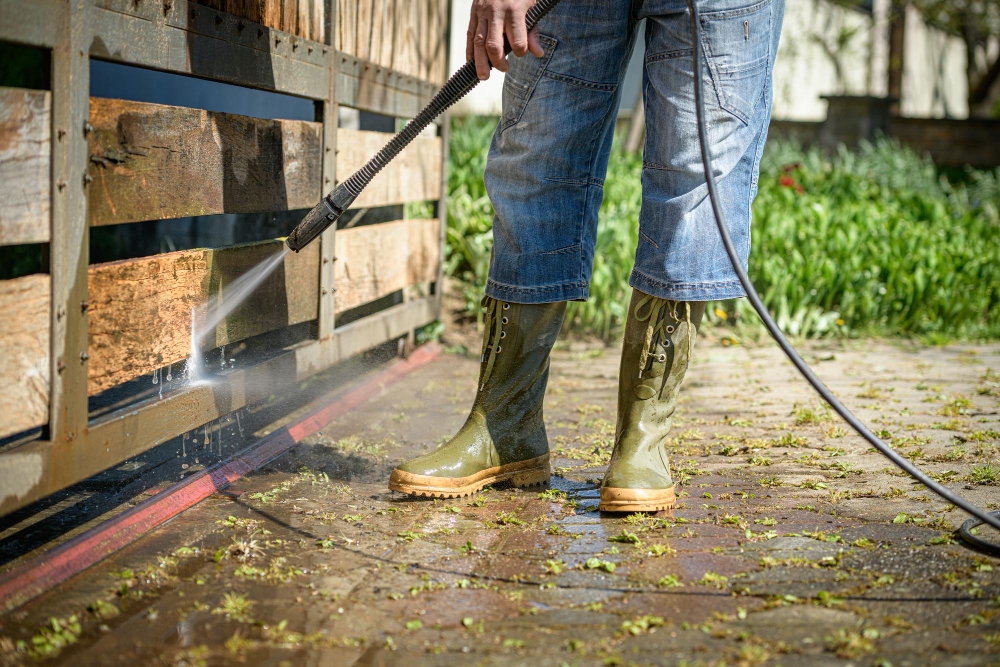
Getting covered may feel overwhelming, but breaking the process down into manageable steps makes it easier to handle. Here’s how contractors can secure pressure washing business insurance:
- Assess Your Needs
- Review your operations to see what type of coverage you need.
- At minimum, most pressure washing businesses require general liability insurance.
- If you have employees, workers compensation insurance will also be required by your state.
- Consider commercial auto insurance if you use vehicles to transport pressure washers, and tools and equipment insurance to protect against theft or damage.
- Request Insurance Quotes
- Contact local insurance agents who understand contractor insurance for cleaning businesses.
- Use online providers like Next Insurance, Insureon, and Thimble.
- Request multiple insurance quotes so you can compare insurance costs and coverage options side-by-side.
- Compare Coverage Options
- Review policy limits, exclusions, and the type of coverage offered.
- Check if your state requires specific insurance coverage levels.
- Look for policies that cover the costs of property damage, bodily injury, tools, and vehicles.
- Contractors should prioritize financial protection that aligns with their business size and job site risks.
- Select a Provider
- Choose the insurer that balances affordability with comprehensive insurance coverage.
- Once you’ve selected a policy, pay your premium to activate coverage.
- Make sure you understand how to file a claim in case an incident occurs.
- Maintain Your Policy
- Keep records updated with your insurance provider.
- File a claim promptly if accidents happen on a job site.
- Adjust coverage options as your business grows, adding workers comp, commercial property insurance, or umbrella insurance when needed.
- Review insurance quotes regularly to ensure you’re still getting the best value for your coverage.
For related operational advice, see our guides on How To Pressure Wash A House: Step-by-step Guide and How To Use A Pressure Washer: A Contractor’s Guide.
Which is the Best Pressure Washing Business Insurance?
Here’s a quick comparison of the main providers most pressure washing businesses consider:
- Next Insurance
- Flexible policies with relatively low insurance costs.
- Fast online application process and customizable coverage options.
- Great for contractors who want to adjust policies quickly as their business grows.
- Insureon
- Functions as an online marketplace to compare insurance quotes from multiple providers.
- Helpful for balancing price with a wide range of coverage options.
- Often recommended by insurance agents for contractors who want side-by-side comparisons in one place.
- Thimble
- Best suited for short-term policies and part-time cleaning contractors.
- Provides on-demand coverage by the hour, day, or month.
- Ideal for small businesses or new contractors who want peace of mind without committing to a long-term policy.

A Better Alternative for Contractors
Beyond insurance, managing finances helps protect your business. With Invoice Fly’s Invoicing Software Maker, pressure washing businesses can:
- Create professional invoices for clients
- Track job site expenses
- Accept online payments for cleaning services
- Organize records for when you need to file a claim
You can also try Invoice Generator and Invoice Templates for additional support and resources.
FAQs about Pressure Washing Business Insurance
General liability insurance is the most important policy, but additional insurance such as workers compensation insurance and commercial auto insurance provide broader financial protection.
Permits vary by state. Some states require contractor licenses, proof of general liability coverage, and workers comp before granting approval. Learn more in our guide on How To Get Your Pressure Washing Business License.Eco-friendly detergents are safest for siding, landscaping, and reducing environmental impact.
The cost depends on the type of coverage, but averages $50–$150 monthly for small businesses.
An LLC offers financial protection by separating business liability from personal liability. The IRS also notes LLCs have flexible tax options.
It depends on your state and type of coverage. Comparing multiple insurance quotes is the best way to find affordable insurance for pressure washing businesses.
